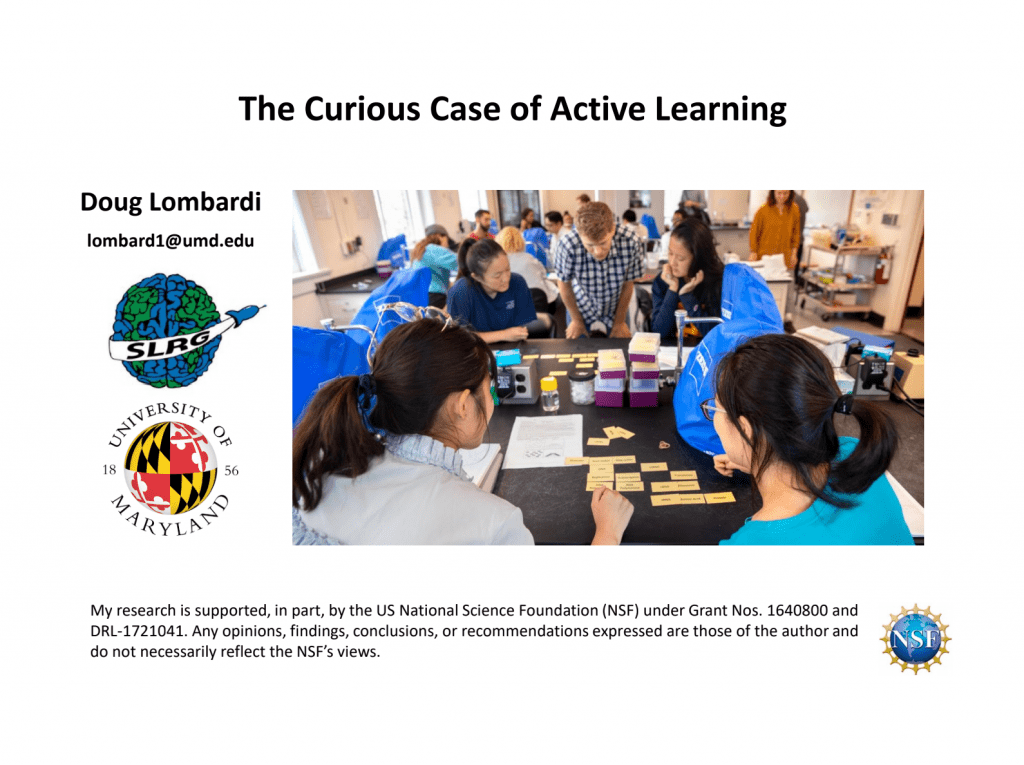Check out Doug Lombardi’s presentation, The Curious Case of Active Learning, at the Educational Psychology Colloquium at UMD (9/10/19)!
Georgia Teacher Workshop
Our team had such a great time working with Georgia teachers this past week to share the MEL/baMEL resources with educators.
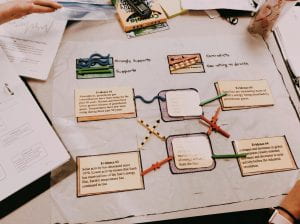
It is always exciting to hear how teachers envision their students using the MEL activities in their own classrooms.
Dr. Donna Governor Publishes New Book
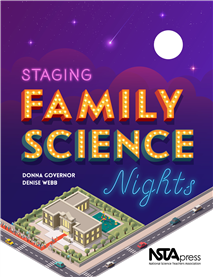
Our very own SLRG team member Dr. Donna Governor published new book “Staging Family Science Nights” now available on the NSTA science store. The book serves as an accessible handbook designed for helping you to create an informal learning environment that will generate enthusiasm and enjoyment of science among the entire family. The book’s first section—“Producing the Event”—devotes eight chapters to planning, recruiting volunteers (including students), setting up, last-minute troubleshooting, and injecting pizazz. The four chapters in the second section—“On the Stage”—offer guidance and templates for activities at the novice, intermediate, and advanced levels. Activities include “Balancing Bugs,” “Bubble Olympics,” and “Creating Color Slime.”
An SLRG Slam Dunk!

Congratulations to SLRG members Shondricka Burrell and Reed Kendall who will be representing the graduate and undergraduate classes, respectively, as the 2019 Temple College of Education Graduation speakers! Their speeches will feature views on how educators should be agents of growth in their communities. We can hardly wait to hear your speeches!
Klavon Selected for Prestigious Institute
Timothy G. Klavon, graduate research assistant in SLRG, has been selected for the 2019 Sandra K. Abell Institute. Selection is highly competitive and many congratulations to Tim!

The Sandra K. Abell Institute is a prestigious event for promising doctoral students in the discipline of science education research and recognizes the importance of investing in these talented individuals. Tim joins a select group of doctoral students and science education scholars that have participated over the last decade.
The 2019 Institute will be held at Middle Tennessee State University in Murfreesboro, TN.
New EdSci Byte
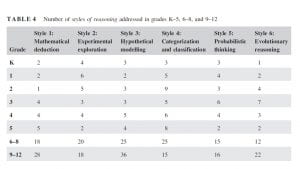 In the article “Toward a more coherent model of science education than the crosscutting concept of the next generation science standards: The affordances of styles of reasoning” Osborne et al., (2017) are trying to investigate and offer a new framework to help guide teachers, curriculum designers, and assessment developers. The model contains 6 styles of scientific reasoning (i.e., mathematical deduction, experimental exploration, hypothetical modeling, categorization and classification, probabilistic thinking, and evolutionary reasoning) and is compared to 7 crosscutting concepts introduced by the Next Generation Science Standards (NGSS). The authors challenge the NGSS point of view of science as a singular construct, and instead discuss how different fields of science have different ontological and epistemic frameworks, and also require different methodologies for investigation. The authors’ framework is designed on the basis of a plurality of science wherein the aim is to enhance NGSS crosscutting concepts by integrating styles of scientific reasoning. Each style of reasoning illuminates a common form of reasoning and epistemology used in specific scientific disciplines. Consequently, the authors suggest consideration of styles of reasoning in considering any future revision of NGSS because this model is coherent with micro and meta-understanding of science educators.
In the article “Toward a more coherent model of science education than the crosscutting concept of the next generation science standards: The affordances of styles of reasoning” Osborne et al., (2017) are trying to investigate and offer a new framework to help guide teachers, curriculum designers, and assessment developers. The model contains 6 styles of scientific reasoning (i.e., mathematical deduction, experimental exploration, hypothetical modeling, categorization and classification, probabilistic thinking, and evolutionary reasoning) and is compared to 7 crosscutting concepts introduced by the Next Generation Science Standards (NGSS). The authors challenge the NGSS point of view of science as a singular construct, and instead discuss how different fields of science have different ontological and epistemic frameworks, and also require different methodologies for investigation. The authors’ framework is designed on the basis of a plurality of science wherein the aim is to enhance NGSS crosscutting concepts by integrating styles of scientific reasoning. Each style of reasoning illuminates a common form of reasoning and epistemology used in specific scientific disciplines. Consequently, the authors suggest consideration of styles of reasoning in considering any future revision of NGSS because this model is coherent with micro and meta-understanding of science educators.
-Busra Uslu and Archie Dobaria
A new SLRG article about makerspaces just published
 Congratulations to Ananya Matewos on the publication of her new article on makerspaces, which are an increasingly popular way to promote design-based learning. The full article is available for download because it was published in the open-access International Journal of STEM Education. To access the article, click here.
Congratulations to Ananya Matewos on the publication of her new article on makerspaces, which are an increasingly popular way to promote design-based learning. The full article is available for download because it was published in the open-access International Journal of STEM Education. To access the article, click here.
New SLRG Publication
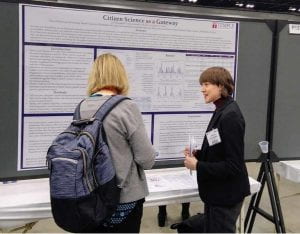 Congratulations to Jess McLaughlin on her poster on the use of citizen science as a way to support inclusive education in college level geoscience classes at the 130th annual Geological Society of America meeting this November. While the poster was not related to work with SLRG, we wanted to take this opportunity to highlight the disciplinary diversity of our group!
Congratulations to Jess McLaughlin on her poster on the use of citizen science as a way to support inclusive education in college level geoscience classes at the 130th annual Geological Society of America meeting this November. While the poster was not related to work with SLRG, we wanted to take this opportunity to highlight the disciplinary diversity of our group!
